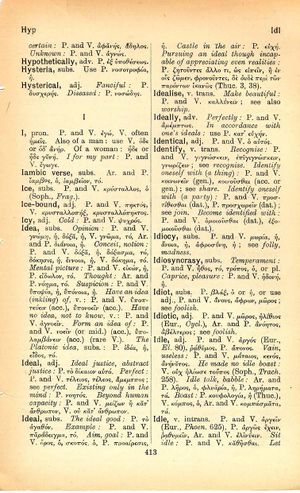idea: Difference between revisions
Ὁ γράμματ' εἰδὼς καὶ περισσὸν νοῦν ἔχει → Qui litteras didicere, mentis plus habent → Wer schreiben kann, hat auch bedeutenden Verstand
m (Text replacement - "(|thumb)\n(\|link=)" to "$1$2") |
m (Text replacement - "(|thumb)\n(\|link=)" to "$1$2") |
||
| Line 1: | Line 1: | ||
{{Woodhouse1 | {{Woodhouse1 | ||
|Text=[[File:woodhouse_413.jpg|thumb | |Text=[[File:woodhouse_413.jpg|thumb|link={{filepath:woodhouse_413.jpg}}]]'''subs.''' | ||
|link={{filepath:woodhouse_413.jpg}}]]'''subs.''' | |||
[[opinion]]: P. and V. [[γνώμη]], ἡ, [[δόξα]], ἡ, V. [[γνῶμα]], τό, Ar. and P. [[διάνοια]], ἡ. | [[opinion]]: P. and V. [[γνώμη]], ἡ, [[δόξα]], ἡ, V. [[γνῶμα]], τό, Ar. and P. [[διάνοια]], ἡ. | ||
Revision as of 17:39, 18 May 2020
English > Greek (Woodhouse)
subs.
opinion: P. and V. γνώμη, ἡ, δόξα, ἡ, V. γνῶμα, τό, Ar. and P. διάνοια, ἡ.
conceit, notion: P. and V. δόξα, ἡ, δόξασμα, τό, δόκησις, ἡ, ἔννοια, ἡ, V. δόκημα, τό.
mental picture: P. and V. εἰκών, ἡ, P. εἴδωλον, τό.
thought: Ar. and P. νόημα, τό.
suspicion: P. and V. ὑποψία, ἡ, ὑπόνοια, ἡ.
have an idea (have an inkling) of v.: P. and V. ὑποπτεύειν (acc.), ὑπονοεῖν (acc.).
have no idea, not to know, v.: P. and V. ἀγνοεῖν.
form an idea of: P. and V. νοεῖν (or mid.) (acc.), ὑπολαμβάνειν (acc.) (rare V.).
the Platonic idea, subs.: P. ἰδέα, ἡ, εἶδος, τό.
Latin > English (Lewis & Short)
ĭdĕa: ae, f., = ιδέα,
I a (Platonic) idea, archetype, Sen. Ep. 58 med. (in Cic. Or. 3, 10; id. Ac. 1, 8, 30; id. Tusc. 1, 24, 58, as Greek).
Latin > French (Gaffiot 2016)
ĭdĕa,¹³ æ, f., idée [de Platon, type des choses : Sen. Ep. 58, 18 ; [Cicéron garde le mot grec ἰδέα : Cic. Ac. 1, 20 ; Tusc. 1, 58 ].
Latin > German (Georges)
idea, ae, f. (ἰδέα), das Urbild, die Idee, das Ideal, Sen. ep. 58, 18 u. 1926. – / Sen. ep. 65, 7 u. in den meisten Ausgaben des Cicero griech. geschrieben, aber in vielen Handschriften latein.; vgl. idos.
Spanish > Greek
ἐνθύμιος, ἐννόημα, διάνοια, ἔννοια, διανόημα, ἐνθύμημα, διανόησις, ἐνθύμησις

